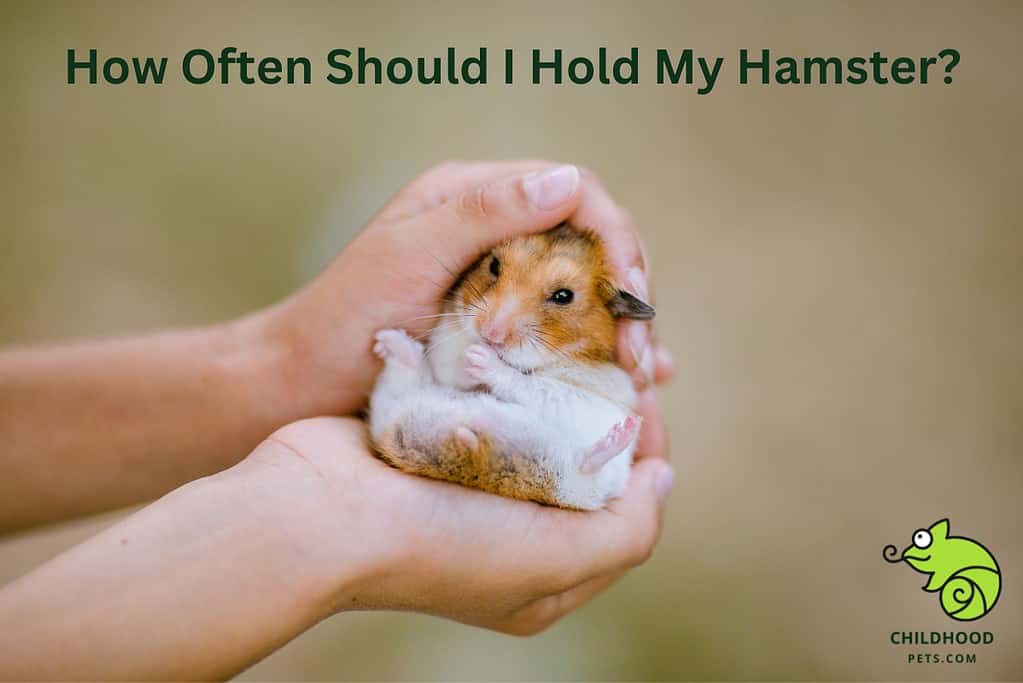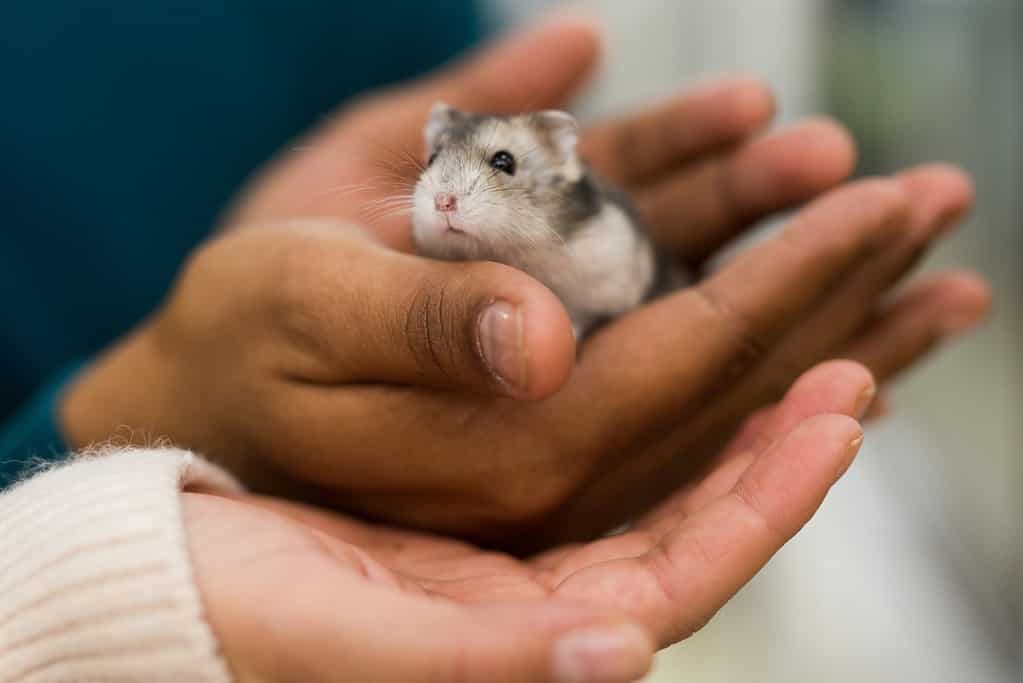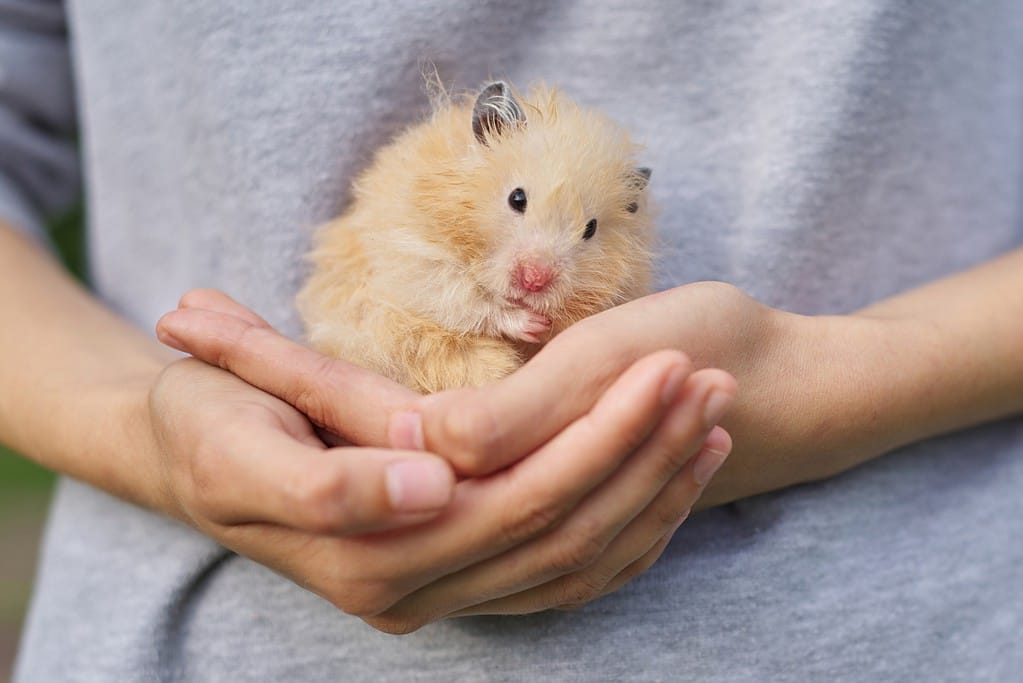
Holding a pet hamster is essential to building a strong bond with it. It can provide them with an excellent chance to explore their surroundings. But how often should you hold your hamster?
On average, daily handling of your hamster is ideal for developing trust and a strong bond. However, taking your furry friend out multiple times a day offers a great opportunity for exercise and exploration. This enriched environment will help keep them physically and mentally active!
In this article, we will discuss hamster holding time, why frequent handling is essential, and tips for safe handling so you and your hamster can enjoy each other’s company.
How Long Should I Hold My Hamster?
When it comes to holding a hamster, it depends on the individual animal and its specific needs.
- Holding your hamster should be kept to a minimum of 5-10 minutes per session, about two or three times a week.
- Keeping your hamster for long periods is not recommended. Over-handling can cause stress and discomfort to the animal, and it may even become aggressive towards you.
- When handling your hamster, always have a firm but gentle grip on the animal’s body so that it feels secure.
- If your hamster seems nervous or agitated while being handled, immediately give him some space by placing him back in his cage.
It’s important to remember that each pet has different needs and preferences, so spend some time observing how comfortable they are when being held.
How to Handle a Hamster?

Hamsters are easy to take care of but require special attention. The followings are some tips on how to handle your hamster:
Washing Your Hands Before and After
It is essential to always wash your hands both before and after handling your hamster. This will aid in eliminating the risk of transmitting disease or germs between you and your pet.
Offering Treats
To get your hamster used to handle, you should start by offering it treats from the palm of your hand or with tweezers. Doing this will make the hamster accustomed to human contact and make handling more accessible.
Scooping Up Gently
To scoop up a hamster, place one hand on either side of its body and gently cup it. Use two hands when holding your hamster. Place one around their chest and the other supporting their bottom so that you can restrict their movement and keep them calm. Once the hamster is securely in your hands, you can lift it out of its cage.
Check out this video below to get a better understanding of the proper scooping method:
Supporting Its Body
When handling a hamster, make sure to support its body at all times. This means keeping a hand under the thorax and holding its tail with the other. Doing this will help keep your pet secure and comfortable while being handled.
Keeping Them Calm
You should always talk softly and reassuringly when handling a hamster, as this will help to keep it calm. Avoid loud noises or sudden movements that may startle or scare your pet.
Placing It Down Safely
When you’re ready to put the hamster back in its cage, place your hands on either side of the cell to lower it. Ensure the hamster’s feet are securely positioned before taking your hands away. Pay attention to the hamster not falling out of your hands when placing it down.
Never Wake Hamster Suddenly From Sleep
When hamsters sleep, they enter a profound inactivity known as torpor. In this state, their heart rate and breathing slow down significantly. Waking your hamster suddenly from this deep sleep can cause it to become stressed.
To avoid these issues, awaken your hamster slowly and gently by speaking softly near its cage or stroking its fur gently with your finger.
Supervising Young Children
It is important to supervise young children when they handle a hamster. This will help ensure the child uses gentle and appropriate handling techniques and protects them from potential harm or bites.
With careful supervision and guidance, most children can learn how to handle a hamster with ease and safely.
Why Should You Handle Your Hamster?

Regular handling of your hamster will help to build trust and a strong bond between you and your pet. As such, there are several key benefits to regular handling:
Reduced Stress and Anxiety
Regularly handling your hamster can reduce stress and anxiety levels, as it helps create a bond between you. This connection can be calming and support to help a sense of security and safety for both of you.
Improved Health
Handling your hamster can improve its physical health by helping to strengthen muscles, aiding digestion, improving circulation, and reducing the risk of developing certain diseases or illnesses. Regular maintenance will help maintain your hamster’s overall well-being.
Stimulation
Handling is also beneficial from a mental perspective, as it stimulates their mind and encourages mental growth. Playing with your hamster, providing toys for them to explore, and spending quality time together will help to keep them entertained, active, and healthy.
Bonding Time
Handling your hamsters can also build a strong bond between you, which is emotionally and physically beneficial. Spending quality time with your pet helps to create an emotional connection which can be calming and reassuring for both of you.
Socialization Opportunities
Handling your hamster also provides opportunities for socialization as they become used to being around people outside of their cage or enclosure and can help them adjust to new environments more quickly and efficiently when necessary, such as when traveling or visiting the vet.
Why Do Some Hamsters Dislike Being Held?
Hamsters are naturally nervous and jumpy creatures due to their natural environment. In the wild, they are hunted by other animals and have developed sharp reflexes to defend themselves against predators. As a result, when humans pick up hamsters, it can trigger an automatic fear response. This is why some hamsters may become scared when picked up and try to escape from your hands or bite out of defense.
The best way to make your hamster feel more comfortable with being handled is to give them time to get used to you first. Put treats in your hand so they approach you willingly, then stroke them gently before attempting to pick them up.
Wrapping Up
Handling a hamster can be beneficial for both the animal and its owner. Not only does it reduce stress and anxiety levels, improve physical health, stimulate mental growth, and build a bond between the two of you, but it also helps to create a sense of safety and security. While some hamsters may take longer to get used to being handled due to their instincts, providing treats and taking time during the process can help make them more comfortable. With patience and care from their owners, most hamsters will eventually learn to trust and enjoy handling.
How often do you hold your hamster? Have you noticed a difference in their behavior since starting to handle them? We’d love to hear about your experiences in the comments below!
Frequently Asked Questions
Is it easy to handle a hamster?
Absolutely. With patience, a gentle touch, and regular interaction, you’ll soon be able to hold your hamster confidently. When first introducing yourself to the animal, taking things slow is essential. Start by holding out an open hand for the hamster to explore. Spend time murmuring calmly so the animal can get used to your presence. Ensure that your fingers are soft and never squeeze too tightly. This will help ensure that handling is a positive experience for the pet.
How long should you wait to hold a hamster?
When getting a new hamster, providing them with the space and time they need to settle into its environment before attempting to handle them is essential. It’s best to wait for at least 12 to 24 hours before holding your hamster, as this will allow them to familiarize themselves with their surroundings. Ensure you provide plenty of food, water, and comfortable bedding during this time.
Should I play with my hamster every day?
Yes, it is crucial to play with your hamster every day. Playing with your hamster can help build a strong bond between you and him, so he will excessed to stay healthy. Try providing different toys or activities for your hamster to explore daily, such as tunnels, ramps, climbing ladders, cardboard boxes, and balls. Encouraging your hamster to come out of his cage during the day will also give him plenty of opportunity to run around and get the exercise he needs.
